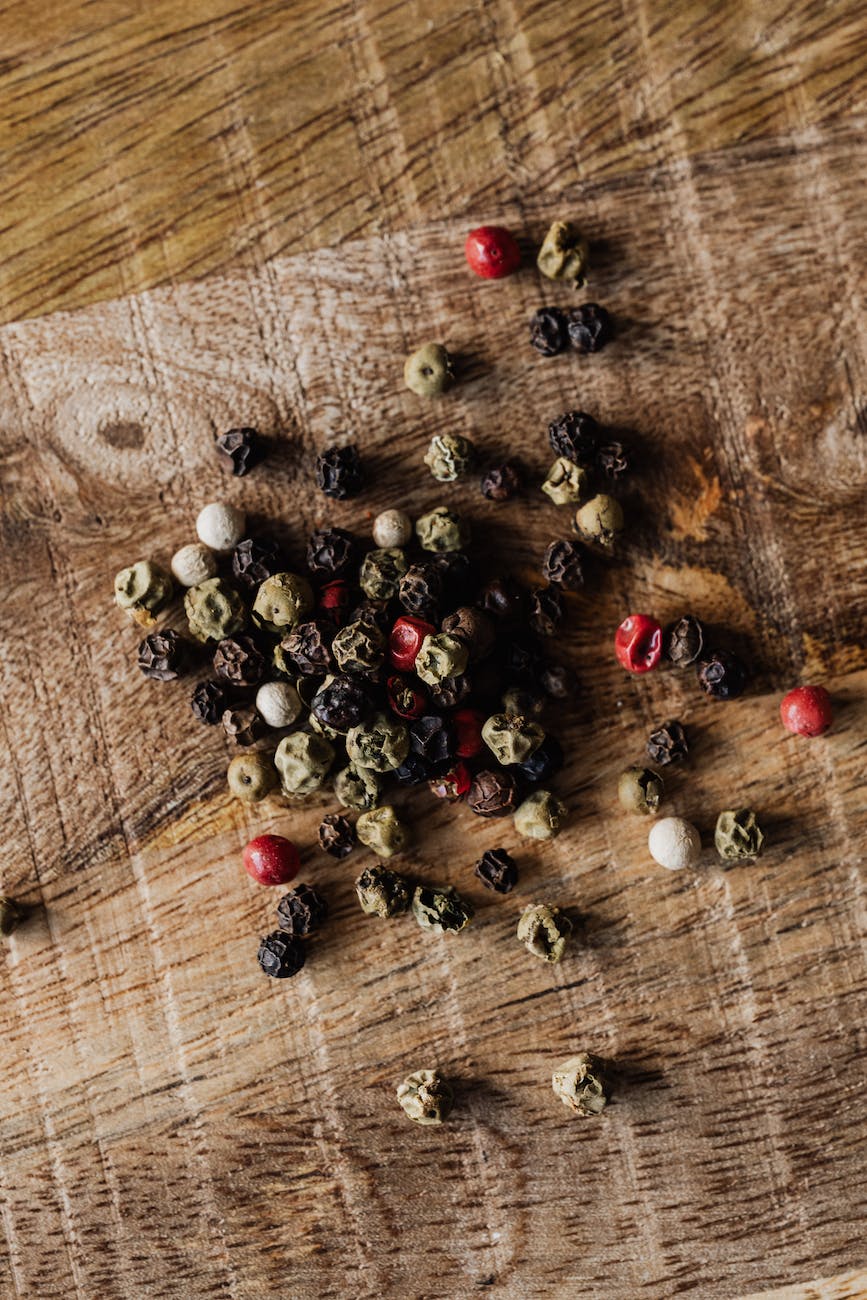
Introduction:
When it comes to the myriad of choices and considerations that encompass pregnancy nutrition, one might not immediately think of the humble black pepper. Yet, this common kitchen spice, often relegated to the background of culinary thought, holds a treasure trove of benefits for expectant mothers. Black pepper, known scientifically as Piper nigrum, is more than just a seasoning – it’s a historical, cultural, and medicinal marvel.
Tracing its origins back to ancient India, black pepper has journeyed through time and across continents, earning its title as the “King of Spices.” It was so valued that it was used as currency, and wars were fought over its control. But what could possibly make this ubiquitous spice so valuable, especially for pregnant women?
The answer lies not just in its ability to transform a meal from bland to bold but also in its impressive array of health benefits, particularly beneficial during the unique and challenging phase of pregnancy. From aiding digestion to boosting immunity, the virtues of black pepper extend far beyond its culinary use.
In this article, we will delve deep into the world of black pepper, uncovering its nutritional profile and the six key benefits it offers to pregnant women. We aim to transform your understanding of this everyday spice, elevating it from a mere afterthought in the pepper shaker to a powerful ally in your pregnancy journey. So, whether you’re grappling with morning sickness, concerned about your immune health, or simply looking to enhance your pregnancy diet with natural and safe ingredients, black pepper might just be the unsung hero you’re looking for.
But, as with all things pregnancy-related, there’s a balance to be struck. We’ll also explore how to incorporate black pepper into your diet effectively and safely, ensuring that you and your little one can reap the full spectrum of its benefits without any unwanted side effects. So, sit back, sprinkle a pinch of black pepper into your favorite pregnancy-safe snack, and join us on this flavorful journey of discovery.
Section 1: The Nutritional Powerhouse of Black Pepper
As we embark on this journey to understand the significance of black pepper during pregnancy, it’s crucial to first unwrap its nutritional profile. Black pepper is not just a spice. It’s a miniature storehouse of health, packed with a spectrum of nutrients that play a pivotal role in maternal and fetal health.
A Peep into the Nutrient-Rich World of Black Pepper
Vitamins and Minerals Galore: Black pepper is a robust source of vitamins such as Vitamin K, Vitamin C, and a suite of B vitamins. These are not mere numbers on a nutrition label; they are crucial contributors to the complex process of growing a new life. Vitamin K is essential for blood clotting, a critical factor during childbirth. Vitamin C, an immune system warrior, also aids in the absorption of iron, combating the common issue of anemia in pregnancy. The B vitamins, meanwhile, are indispensable for energy production and maintaining proper nervous system function.
Minerals for Maternal Might: Dive deeper into the granule of black pepper, and you’ll find a wealth of minerals. Iron, which is vital for increasing the blood volume and preventing anemia, calcium for building strong bones, magnesium for muscle function and preventing preterm labor, and potassium for maintaining fluid balance and nerve function. Each mineral plays a symphonic role in ensuring the well-being of both the mother and the baby.
Piperine – The Secret Ingredient: The most significant compound in black pepper is piperine, which is responsible for its characteristic heat and more. This compound not only enhances the flavor of foods but also boosts the absorption of various nutrients like selenium, vitamin B, and beta-carotene. This bioavailability factor is a game-changer, especially during pregnancy when nutrient absorption becomes paramount.
The Antioxidant Advantage
Combatting Oxidative Stress: Pregnancy is a state where the body’s metabolic demands skyrocket, leading to increased oxidative stress. This is where black pepper’s antioxidants step in. Piperine, along with other antioxidants present in black pepper, scavenge harmful free radicals, protecting both mother and baby from cellular damage. This antioxidant activity is not just crucial for preventing future health issues but also plays a role in immediate pregnancy health.
An Anti-inflammatory Ally
Soothing Inflammation: The anti-inflammatory properties of black pepper are a boon during pregnancy. Many women experience increased inflammation, manifesting in swelling, pain, or even gestational diabetes. Black pepper’s ability to quell inflammation helps in managing these pregnancy-induced conditions more comfortably.
The Bottom Line
Understanding the nutritional essence of black pepper sets a solid foundation for appreciating its role in pregnancy. It’s not just a spice; it’s a complex blend of vitamins, minerals, antioxidants, and compounds like piperine, all working together to support the unique demands of pregnancy. As we unfold its specific benefits in the following sections, keep in mind this rich nutritional tapestry that forms the backdrop of black pepper’s role in maternal health.
This section provides an in-depth look at the nutritional composition of black pepper and sets the stage for discussing its specific benefits in the subsequent sections. The focus is on how each nutrient and compound in black pepper contributes to the health and well-being of both the mother and the developing fetus.
Section 2: Black Pepper’s Benefits in Pregnancy
With its rich nutritional profile established, let’s explore how black pepper specifically benefits pregnancy. Each benefit not only underscores black pepper’s versatility but also highlights its potential role in nurturing and supporting the journey of motherhood.
1. Enhancing Digestive Health
A Digestive Aid: Digestive issues are commonplace in pregnancy, owing to hormonal changes and the physical pressure exerted by the growing fetus. Black pepper, with its piperine content, stimulates the stomach to secrete more hydrochloric acid, which aids in the digestion of proteins and other food components. This action can be a relief for pregnant women experiencing bloating, gas, and indigestion, making meals more comfortable and enjoyable.
Gut Health Promoter: Beyond aiding digestion, black pepper plays a role in maintaining a healthy gut. A well-functioning digestive system is crucial for the optimal absorption of nutrients, which are paramount for fetal growth and development.
2. Strengthening Immune System
Natural Immunity Booster: During pregnancy, a woman’s immune system undergoes adjustments, which can leave her more susceptible to infections. The vitamin C in black pepper is a natural immune booster, fortifying the body’s defenses. Moreover, the anti-inflammatory properties of piperine contribute to a more robust immune response, ensuring both mother and child are better protected against potential pathogens.
3. Potent Antioxidant and Anti-inflammatory Effects
Combatting Cellular Stress: The antioxidant properties of black pepper are particularly valuable during pregnancy. These antioxidants, including piperine, fight against oxidative stress, which is elevated during pregnancy due to increased metabolic activity. This protective mechanism is vital in safeguarding the mother’s and baby’s cells from damage, contributing to overall health and well-being.
Reducing Inflammation: Pregnancy can often lead to inflammation in various parts of the body. Black pepper’s anti-inflammatory properties can help reduce such inflammatory responses, providing comfort from issues like swelling and pain, which are common in later stages of pregnancy.
4. Relieving Common Pregnancy Symptoms
Cold and Cough Remedy: Black pepper’s expectorant properties make it an excellent natural remedy for relieving symptoms of cold and cough, which are common during pregnancy. Its ability to clear respiratory tract congestion and its antimicrobial properties help in managing these symptoms without relying heavily on over-the-counter medications.
Mood Enhancer: Hormonal fluctuations during pregnancy can lead to mood swings and even depression. The piperine in black pepper has been suggested to have antidepressant-like effects, potentially helping to elevate mood and combat pregnancy-related blues.
5. Supporting Cardiovascular Health
Blood Pressure Management: High blood pressure is a concern during pregnancy, as it can lead to complications like preeclampsia. Black pepper, rich in potassium, helps in regulating blood pressure levels. Its vasodilatory effects ensure better blood flow, reducing the risk of hypertension and supporting overall cardiovascular health.
Cholesterol Control: Maintaining healthy cholesterol levels is vital during pregnancy. Piperine has been shown to have a cholesterol-lowering effect, thus contributing to heart health and reducing the risk of gestational cardiovascular issues.
6. Fetal Development and Maternal Health
Aiding in Nutrient Absorption: The piperine in black pepper enhances the bioavailability of various nutrients essential for pregnancy, such as iron, calcium, and vitamins. This improved absorption is crucial for the optimal development of the fetus and the health of the mother.
Rich Source of Folate: Black pepper contains folate, a vital nutrient for preventing neural tube defects in the developing fetus. This makes it an invaluable addition to the pregnancy diet, contributing to the healthy development of the baby’s brain and spinal cord.
The benefits of black pepper in pregnancy are diverse and significant. From aiding digestion to boosting immunity, alleviating common pregnancy symptoms, and supporting both maternal and fetal health, black pepper emerges as a spice of great value. Its role in a pregnancy diet transcends mere flavoring, providing a myriad of health benefits backed by its rich nutritional content. In the next section, we will delve into how to safely incorporate black pepper into your pregnancy diet, balancing its benefits with mindful consumption.
Section 3: How to Safely Incorporate Black Pepper into Your Pregnancy Diet
Having unraveled the myriad benefits of black pepper for pregnancy, it’s essential to understand how to incorporate this spice into your diet safely and effectively. Pregnancy is a delicate period, and what you consume has a direct impact on both your health and that of your developing baby. Let’s delve into the practical aspects of using black pepper, ensuring you reap its benefits without overdoing it.
Moderation: The Key Principle
Understanding Limits: While black pepper is beneficial, like all things, it should be consumed in moderation. Excessive consumption can lead to gastrointestinal issues or exacerbate heartburn, a common pregnancy discomfort. The idea is to use black pepper as a flavor enhancer, not the main ingredient.
Recommended Intake: There isn’t a one-size-fits-all recommendation for black pepper intake during pregnancy, as individual tolerance levels vary. However, a general guideline is to limit black pepper usage to what you would typically use to season food. If you’re new to black pepper, start with a small amount and observe how your body reacts.
Incorporating Black Pepper into Your Diet
Culinary Uses: Black pepper is incredibly versatile in the kitchen. You can sprinkle ground black pepper on salads, soups, and stews for added flavor. It’s also great in marinades, dressings, and sauces, giving a spicy kick to your meals.
Pairing with Other Spices: Black pepper pairs well with various herbs and spices, enhancing both flavor and health benefits. For instance, combining black pepper with turmeric not only adds depth to dishes but also increases the absorption of curcumin, turmeric’s active compound, thanks to piperine.
Creative Cooking: Get creative with black pepper. Use it in rubs for meats or add a pinch to your favorite smoothie or juice. The spice’s versatility means it can be incorporated into both sweet and savory dishes.
Quality Matters
Choosing the Right Product: The quality of black pepper is crucial. Opt for organic, non-irradiated black pepper to avoid contaminants and ensure maximum health benefits. Whole peppercorns, ground fresh, are the best choice as they retain their flavor and nutrients better than pre-ground pepper.
Storage for Freshness: Store black pepper in a cool, dark place in an airtight container to maintain its potency and prevent spoilage. Freshly ground pepper is more flavorful and beneficial than pre-ground versions that might have lost some of their piperine content.
Listening to Your Body
Individual Responses: Pay attention to how your body reacts to black pepper. Some women may find that even small amounts can trigger heartburn or indigestion. If you experience any adverse effects, reduce the amount or eliminate it from your diet.
Consulting Healthcare Providers: If you have specific health concerns or dietary restrictions, consult with your healthcare provider before making significant changes to your diet, including the addition of black pepper.
Incorporating black pepper into your pregnancy diet can be a delightful and healthful experience when done thoughtfully. Its versatility in cooking allows for various uses, catering to personal tastes and culinary preferences. Remember, the key is moderation and quality. By respecting these principles, you can enjoy the flavor and health benefits of black pepper, contributing positively to your pregnancy journey. In the next section, we’ll discuss precautions and recommend intake to help you navigate the balance between benefit and safety.
Section 4: Precautions and Recommended Intake
While the benefits of black pepper during pregnancy are substantial, it’s imperative to approach its consumption with awareness and care. This section is dedicated to guiding expectant mothers on the precautions and recommended intake of black pepper to ensure a safe and healthy pregnancy.
Understanding the Precautions
Gastrointestinal Sensitivity: One of the primary concerns with black pepper consumption during pregnancy is its potential to cause or exacerbate gastrointestinal issues. Pregnant women often experience heightened sensitivity to spices, and black pepper can induce heartburn, acid reflux, or indigestion in some cases. It’s essential to monitor how your body reacts and adjust your intake accordingly.
Allergic Reactions and Sensitivities: Although rare, allergic reactions to black pepper can occur. Symptoms might include itching, rashes, or gastrointestinal discomfort. If you suspect an allergy to black pepper or experience any adverse reactions, discontinue use and consult your healthcare provider.
Medicinal Interactions: Black pepper, specifically the compound piperine, can affect the absorption and metabolism of certain medications. If you’re on any prescription drugs, especially those related to pregnancy, consult with your doctor to ensure that adding black pepper to your diet won’t interfere with your medication.
Recommended Intake of Black Pepper in Pregnancy
Moderation is Crucial: The overarching theme in consuming black pepper during pregnancy is moderation. The spice should be used as a flavor enhancer, not as a primary ingredient. A light sprinkling or a pinch in cooking is typically sufficient to reap its benefits without overdoing it.
Personal Tolerance Levels: Pregnancy is a unique experience, and each woman’s body reacts differently to various foods and spices. Start with a minimal amount of black pepper and observe how you feel. If you don’t experience any adverse effects, you can gradually increase the amount as per your taste and tolerance.
Tips for Safe Consumption
Incorporate Gradually: If you’re not used to consuming black pepper, introduce it gradually into your diet. This approach helps your body adjust to the spice and reduces the likelihood of digestive discomfort.
Balancing with Other Ingredients: When using black pepper in cooking, balance it with other ingredients to avoid overpowering the dish. This not only makes for a more palatable meal but also ensures that you’re not consuming too much pepper.
Avoid High Doses: Steer clear of consuming high doses of black pepper, such as supplements or concentrated forms, unless advised by a healthcare professional. The focus should be on dietary levels of intake rather than medicinal quantities.
Consulting Healthcare Providers
Professional Guidance: Always consult your healthcare provider for personalized advice regarding your diet during pregnancy. They can provide guidance based on your health history, dietary needs, and any existing medical conditions.
Conclusion of Section
Navigating the use of black pepper during pregnancy requires a balance between enjoying its benefits and being mindful of its potential risks. By adhering to the principles of moderation, being attentive to your body’s reactions, and seeking professional advice, you can safely include black pepper in your pregnancy diet. This cautious approach ensures that you and your baby can enjoy the spice’s benefits without any undue risks.
In this section, we’ve outlined the precautions and recommended intake levels for black pepper during pregnancy. These guidelines are crucial for maintaining a healthy balance, ensuring that expectant mothers can enjoy the spice’s benefits while minimizing any potential risks.
Section 5: Conclusion and Final Thoughts
As we wrap up our exploration of black pepper’s role in pregnancy, it’s clear that this common spice is more than just a flavor enhancer; it’s a nutritional powerhouse with multiple benefits for expectant mothers. However, understanding how to harness these benefits while respecting the body’s changing needs during pregnancy is key. Let’s summarize our key findings and offer some final thoughts for pregnant women considering adding black pepper to their diet.
Summarizing the Benefits of Black Pepper
Digestive Health and Nutrient Absorption: Black pepper aids digestion and helps reduce pregnancy-related gastrointestinal discomforts. Its ability to enhance the absorption of essential nutrients is particularly beneficial during this critical period.
Immune System Support and Antioxidant Properties: The spice boosts the immune system and offers antioxidant properties, protecting both the mother and the developing fetus from potential cellular damage.
Mental Health and General Well-being: With its potential mood-enhancing properties, black pepper can play a role in managing pregnancy-related mood swings and depression.
Cardiovascular and Fetal Health: Its contribution to maintaining blood pressure levels and providing essential nutrients like folate underscores its importance for both maternal and fetal health.
Emphasizing the Importance of Moderation and Quality
While black pepper offers numerous health benefits, moderation remains paramount. Excessive consumption can lead to undesirable effects, particularly in a pregnancy where the body’s response to foods can vary significantly. The quality of black pepper is equally important. Opting for organic, high-quality black pepper ensures maximum benefits free from contaminants.
Encouraging Mindful Consumption
Mindful consumption of black pepper, paying attention to your body’s responses, and adjusting intake accordingly, is advisable. Every pregnancy is unique, and what works for one individual might not work for another. Listening to your body and consulting with healthcare providers for personalized dietary advice is crucial.
Final Thoughts for Expectant Mothers
Incorporating black pepper into your pregnancy diet can be a delightful, flavorful experience that also brings numerous health benefits. However, it should be done thoughtfully and in moderation. As you navigate through the various stages of pregnancy, remember that diet plays a crucial role not just in your health but also in the health of your baby. Spices like black pepper can be a part of a balanced, nutritious diet that supports both your well-being and that of your developing child.
Closing Call-to-Action
We invite you to share your experiences with incorporating black pepper into your pregnancy diet. Have you found innovative ways to include it in your meals? Have you noticed any particular benefits or challenges? Your insights could be immensely valuable to other expectant mothers. Feel free to leave a comment below, and if you found this article helpful, consider sharing it with other pregnant women in your community. For more tips on a healthy pregnancy diet and lifestyle, subscribe to our newsletter.
10 FAQs and Answers for “6 Benefits of Black Pepper for Pregnancy”
- Is black pepper safe to consume during pregnancy? Yes, black pepper is generally safe for pregnant women when used in moderation as a spice in cooking.
- How does black pepper benefit pregnant women? Black pepper aids digestion, boosts immunity, has antioxidant properties, supports mental health, and helps in nutrient absorption, which are all beneficial during pregnancy.
- Can black pepper cause any side effects during pregnancy? While black pepper is safe, excessive consumption can lead to gastrointestinal issues like heartburn or indigestion, especially in those with sensitive stomachs.
- How much black pepper is safe during pregnancy? There is no specific recommended amount, but it should be used in moderation, typically as a seasoning rather than a main ingredient.
- Can black pepper help with pregnancy-related digestive issues? Yes, black pepper can improve digestion and reduce symptoms like bloating and gas during pregnancy.
- Is black pepper a good source of nutrients for pregnant women? Absolutely, black pepper is rich in vitamins (like Vitamin C and K) and minerals, making it a nutritious addition to a pregnancy diet.
- Does black pepper have any role in fetal development? Black pepper contains folate, which is essential for fetal brain and spinal cord development, and aids in the absorption of other vital nutrients.
- Can consuming black pepper affect blood pressure during pregnancy? Black pepper can help in managing blood pressure levels, but it should be consumed in moderation and monitored, especially for those with blood pressure concerns.
- How can I incorporate black pepper into my pregnancy diet? Black pepper can be sprinkled on salads, soups, and other dishes. It’s best used as a flavor enhancer in combination with other spices.
- Should I consult my doctor before adding black pepper to my diet during pregnancy? If you have any concerns or are taking specific medications, it’s always wise to consult your healthcare provider before making significant dietary changes.
Blog Tags for the Post:
pregnancy nutrition, black pepper benefits, healthy pregnancy diet, maternal health, natural remedies, digestive health, immune support, antioxidant foods, mental wellness, fetal development, dietary tips, pregnancy care, spice benefits, cooking during pregnancy














